
4 Merits of Freelancers as Solution to Your Talent Needs
The human resource is one of the most significant resources that a business needs for its operations. It is that resource which manages the other resources and also the one that appreciates with time. So, every business wants to build and maintain a good human resource pool.
Small businesses often struggle with the shortage of funds. This becomes a limiting factor for most of their critical decisions. Still, as an owner, you want the best for your business.
The need for the best talent is reasonable as humans are the backbone of any business. Small businesses often face the following problems related to human resources:
-
Scarcity of Talent
The studies in labor economics suggest that there is a scarcity of experienced and talented professionals in the industry as they are more in demand. Moreover, some of the best companies offer them higher compensation to work with them.
Most such experts are not very keen to work with small businesses as they prefer to be associated with bigger brands. It is thus not possible for small businesses to attract or retain highly experienced professionals.
-
Less Work to Keep Them Occupied
Small businesses have many tasks other than their core competencies and they require experienced people for doing the same. For example, any business requires a regular update of its website. It is not feasible for any small business to specially hire a full-time employee for managing such tasks which span over hardly 2-3 hours a day.
-
Infrastructural Constraints
The infrastructural facilities of small businesses including space and equipment are not enough to support excessive hiring.
So, how can a small business procure the right talent? Well, freelancers are the answer to all your talent requirements. This article discusses how working with freelancers benefits small businesses.
-
Variety of Payment Models
There are different ways in which payments can be made to freelancers. The two most popular models are summarised here.
-
Pay-per-project Model
When hired for a specific project, the services of such a professional span from the starting to the completion of the project. In this case, payment can be made either at the achievement of significant milestones or at the end of the project.
Generally, the payment intervals are pre-decided and negotiated before engaging in the contract. Services of these professionals can be reviewed after the completion of the project.
The decision of rehiring for the subsequent projects is usually based on the freelance service provider’s performance in the previous one.
-
Pay-per-hour Model
In this model, payments are agreed to be paid based on a pre-decided hourly rate. Where the workload or project scope cannot be defined beforehand, this is the best model as the freelancer can be paid on the number of hours contributed.
Similarly, for a task that requires not more than 4-5 hours of work per week, the company does not have to incur the costs of a full-time employee.
-
No Obligation for Additional Perks
Most countries have specific laws governing payment of monetary or non-monetary benefits to their full-time employees. These perquisites include social security, medical and many other components which are an added cost burden for small businesses.
Most full-time employees also expect transport or relocation expenses to be borne by the employer. While in the case of freelancers, there are no additional benefits applicable and the compensation is as per the agreed terms of the contract.
-
Exemption From Location Constraints
Domain specialists from any location in the world can be hired as freelancers. Some of the best talents are available as freelancers as it gives such professionals the freedom of balancing their work and life.
The concept of remote team, implemented through cloud technology, has further empowered small businesses in making their processes simpler and better. Team meetings and data sharing is no more a constraint for remote team members now.
-
Time Flexibility
Most freelancers are available to work during weekends also. The work doesn’t suffer even when the company is actually enjoying a weekend. Freelancer has to manage his time himself.
Moreover, the company hiring such a freelancer can just negotiate on specific deadlines and it is the responsibility of the freelancer to complete the task according to the agreed deadlines.
Conclusion
Small business can concentrate on their core competency and leave rest of the tasks on the expert freelancers working for them.
So, hire a freelancer now, if you haven’t done that already!